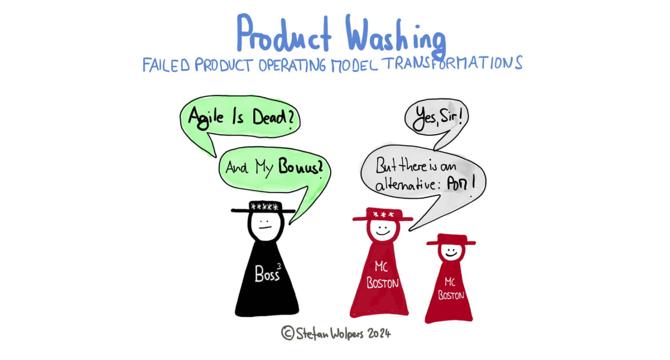Scrum
3d
291

Image Credit: Scrum
Product Washing
- The product operating model has become very popular among many companies, promising a more customer-focused and outcome-oriented approach that empowers teams to create value iteratively and autonomously.
- However, the misuse and abuse of the product operating model term may lead to a hollow adoption of product practices, offering a new buzzword but no significant changes.
- Organizations that are eager to save the status quo without proper transformation may adopt the Product Washing, which refers to cosmetic changes and new vocabulary without genuine empowerment, accountability, and culture shift.
- Executive leaders and other stakeholders may assert the rhetoric of the product-led philosophy but resist POM implementation, aiming to preserve resources, project timelines, and strategic decisions.
- Similarly, external consultancies may promote POM as a turnkey solution, focusing on replicable templates and processes rather than context-sensitive transformation. They prioritize visible, short-term outcomes to justify their fees over fundamental cultural changes needed for the product operating model.
- Some of the most common anti-patterns of a hollow product operating model transformation include surface-level structural changes without empowerment or accountability, renaming project managers and business analysts as product managers without redefining roles, and token autonomy without real decision-making authority.
- To establish a genuine product operating model transformation, organizations need to go beyond labels and create conditions where product-led practices thrive.
- It requires leadership alignment on product goals, building internal expertise, shifting metrics to focus on outcomes and adapting bonus systems, starting with pilot teams and scaling intentionally, and committing to a culture of learning and adaptation.
- True transformation involves bold, often uncomfortable cultural shifts, accountability, and leadership buy-in to deliver the product operating model's promise of a better, more effective, and outcome-driven approach.
- Product Washing, on the other hand, may lead to cynicism and disillusionment, leaving organizations stuck in old dynamics with a new vocabulary.
Read Full Article
17 Likes
For uninterrupted reading, download the app